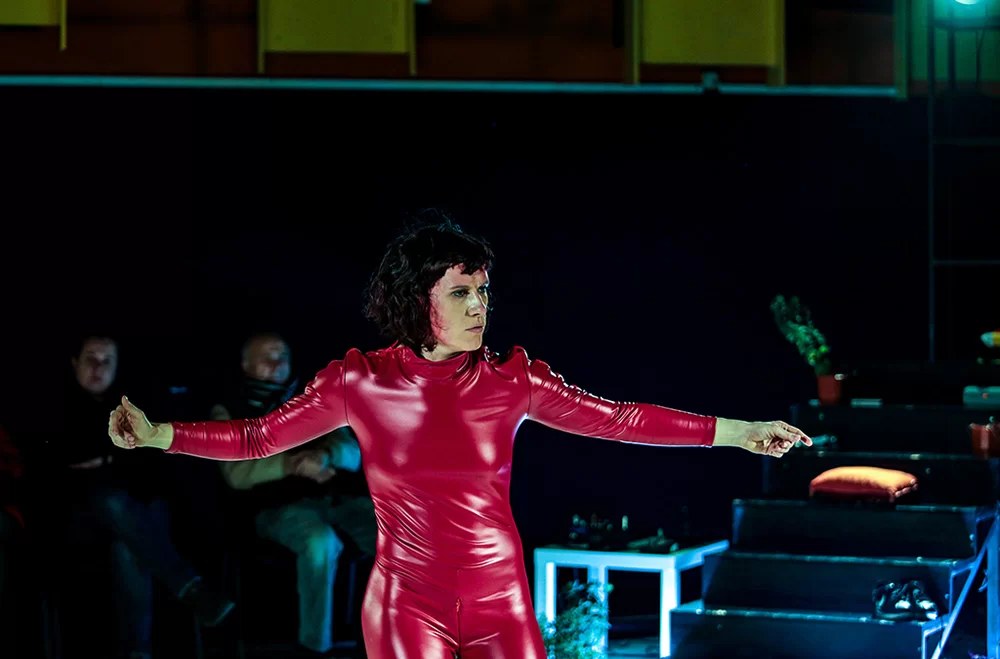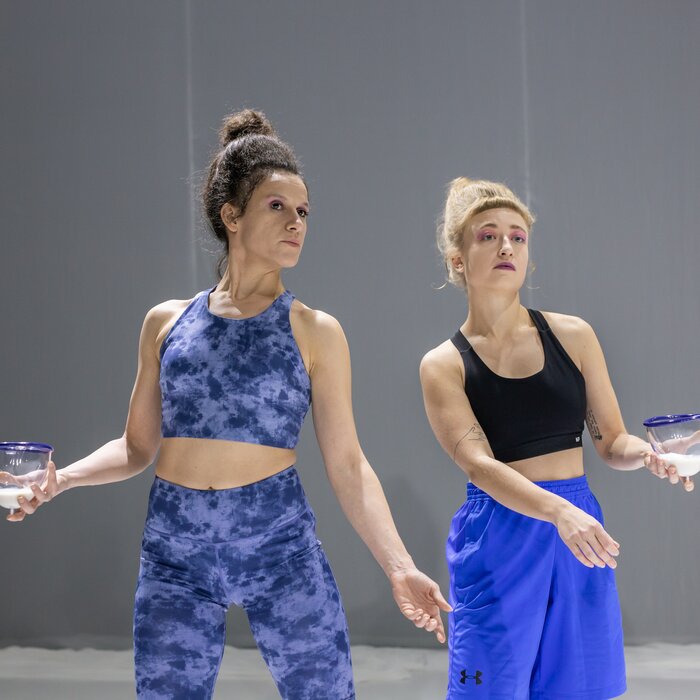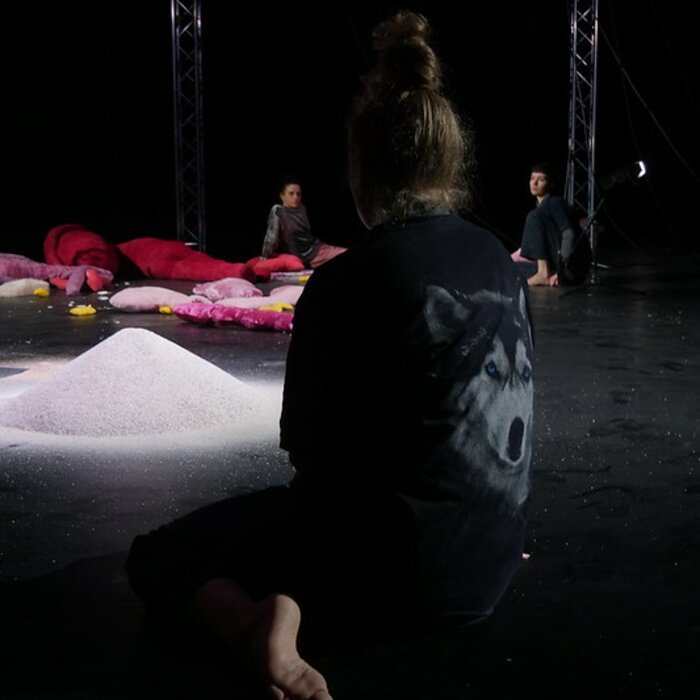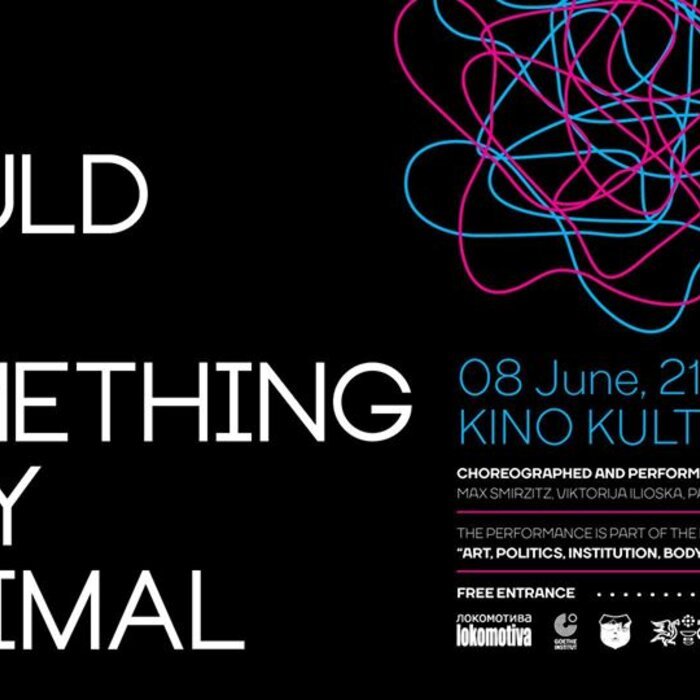Who are you? Where are you right now and where do you belong to? What is your superpower? Figure it out! is a confrontation with the relation from political to individual identity by choreographer Viktorija Ilioska. The performer exposes mechanisms of foreign and self attributions in 100 questions to herself. The body, object to projections of societal role perceptions, is a central medium of expression of the solo performance. Between “Viktorija, what is East and what is West if you were a dog?“, “Viktorija, what happens in the future?“, or: „Viktorija, how long do you brush your teeth?“ the boundaries become blurred between questioners and respondents, stage action and daily reality. Therefore, Figure it out! is literally also a questioning to the audience, as an impulse to reflect. Perhaps they can be found here, the answers to the questions of humanity.

Synopsis
INTERVIEW WITH VIKTORIJA ILIOSKA
When did you discover your passion for the performing arts?
I think passion is definitely overrated and (over)used. I tend to think rather through desire than through passion. But anyway, I will answer this question by how I finished in performing arts. Born during the independence of Macedonia, I was part of the generation termed “the children of transition.” This meant that I grew up in a system that radically shifted from communistic-socialistic ideologies to become a hybrid democratic-capitalistic system in the Balkan region. Thus, adaptation and personal transformations were inevitable and became part of the everyday practice in Macedonia. On a personal level, this meant that I had to find my own place and voice within my country both as a woman and citizen of a chaotically structured and constantly transforming society. Consequently, there was a need for me to find what I was best at instead of what made me feel good. Performativity became part of being myself, and to know “how” to perform oneself was an important part of claiming space in the public sphere. Following my own personal struggle within these paradigms led me to performance as a means of survival and of building identity. I began developing a practice of provocations, which allowed me to be present in the public sphere as well as to widen my own understanding of my self in relation to my social contexts. As a result, my artistic aim has become to directly influence social contexts and structures through dance and performance.
What has been your greatest achievement/ hurdle?
I would say that the greatest achievement can at the same time be an obstacle, a hurdle. Being 31 today, I can say that I somehow managed to work and live from art, as well as live art: to include it in every segment of my life, study it, earn from it and build my social engagement, my friendships, and relationships through it. Having said that, I am poignantly aware that this entanglement can at the same time present a burden. In the hybrid-capitalistic I-wanna-be time we live in, the work-life balance that freelance artists are struggling with has become the biggest myth, which I think brought us to fragmentation, competition, and precarity, working 11 hours per day for the promised work fulfilment. The cure became the poison.
What do you hope to achieve not only in performing arts but also outside?
Well, if I may connect this question with the previous one, I would like to achieve a sustainable, safe and secure career and life because, as Konstrakta is singing, the female artist must be healthy! :) Be that as it may, mostly I would like the Balkan scene of performing arts to achieve sustainability and to create many more connections among the Balkan countries. I think there is a huge potential and knowledge within the field, and it is high time we recognized that.
Do you perform/choreograph for a greater purpose?
I need to admit that ‘greater purpose’ sounds to me like something holy, something religious :). Indeed, we might call ‘holy’ that social phenomenon, the very fact that at a certain time, an audience comes together at a certain place to witness something that was made for them to experience. Maybe exactly that consent, one can say, a contract, between me as an artist and the audience as witnesses portrays the greater purpose while at the same time producing a picture of the social and political engagement of the performing arts themselves.
What do your performances say about the cultures or societies they represent?
I think, in general, my performances show a lack or surplus of something in cultures or societies I am coming from. Most of the time, I am provoking some thoughts and asking some questions through a subtle interactive act, with which I don’t mean to attack but much rather to open up a conversation, a thinking process within the togetherness that the audience and the performer come to create.
Where did the concept for this performance originate?
This performance definitely originated out of a need, and it mirrors the introspection, an inner search, or an attempt to understand my identity as a woman. It shifts between a personal portrait and a social one. Or more concretely, I tried to open up questions about female representation in the social, political, and public sphere through some short autobiographical stories. For example, what is the percentage of women in the parliament in Bulgaria, 20%? 22%? And at the same time, when did women get the right to vote in Bulgaria, in 1944, obtaining the full voting rights? Well, I think it is not enough – neither the percentage nor the time we had to work on the organizational forms, not even talking about the fact that women are the half of the voting body, and still we are not managing to support ourselves well… I am trying to bring questions and open paradoxes similar to these ones.
Which of the 100 questions is the most important for the audience to consider?
“Viktorija, did Macedonia change its name and enter in Nato and EU?”, I assume.
At what age did you discover you were born to perform?
This question makes me laugh a bit :). I think I should check this with my parents, but knowing that I performed as a fox in the kindergarten, learned a couple of pages of text by heart, and loved performing them to every guest that visited us… for a couple of years in a row.. I think someone else had noticed that I would perform before I did, and for sure those were my parents.




